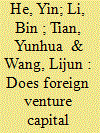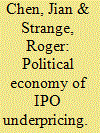| Srl | Item |
| 1 |
ID:
144860


|
|
|
|
|
| Summary/Abstract |
This paper uses all 1404 initial public offerings (IPO) undertaken between 2002 and 2012 in China to analyze whether venture capital (VC) investment, especially foreign VC investment, brings more or less value-added services to the invested companies during the 3 years following the IPO. The results show that venture capitalists choose to invest in companies with higher value potential, and, in turn, the value of the companies increases after the IPO is undertaken; foreign VC adds more value to companies than domestic venture capital. However, the profitability of VC-backed and non VC-backed companies after IPO does not differ significantly. Nevertheless, it is shown that VC plays an active role in China.
|
|
|
|
|
|
|
|
|
|
|
|
|
|
|
|
| 2 |
ID:
159060


|
|
|
|
|
| Summary/Abstract |
We study the role of excessive employment as a selection criterion for initial public offerings (IPOs) in China. Using a large dataset of firms that are eligible for a public offering, we find that firms' that have more excess employment – that is, firms that hire too many people – are more likely to be selected for an IPO. This correlation is stronger for the private sector than for the state sector, suggesting that stock market capital is used to direct capital flows to private firms that comply with politicians' preferred labor practices. A third set of results corroborates the inefficiency of this selection rule by showing that firms with more excess labor underperform after the IPO. We conclude that a political system known for its interventionistic government policies uses its influence over the stock market to signal preferred employment practices.
|
|
|
|
|
|
|
|
|
|
|
|
|
|
|
|
| 3 |
ID:
112402


|
|
|
|
|
| Publication |
2012.
|
| Summary/Abstract |
This paper looks at the IPO underpricing puzzle in a political economy perspective, as previous theories have considered only the 'market economy factor' in IPO underpricing, and failed to incorporate the 'political economy factor' in determining IPO underpricing. This is particularly relevant to emerging markets such as China, where the IPO is not only a process of raising fresh capital, but also one of privatisation. By examining the Chinese case with the political economy perspective, we find that the IPO underpricing is negatively related to the proportion of the shares held by various government organisations. We also offer explanations using an angle of political economy.
|
|
|
|
|
|
|
|
|
|
|
|
|
|
|
|